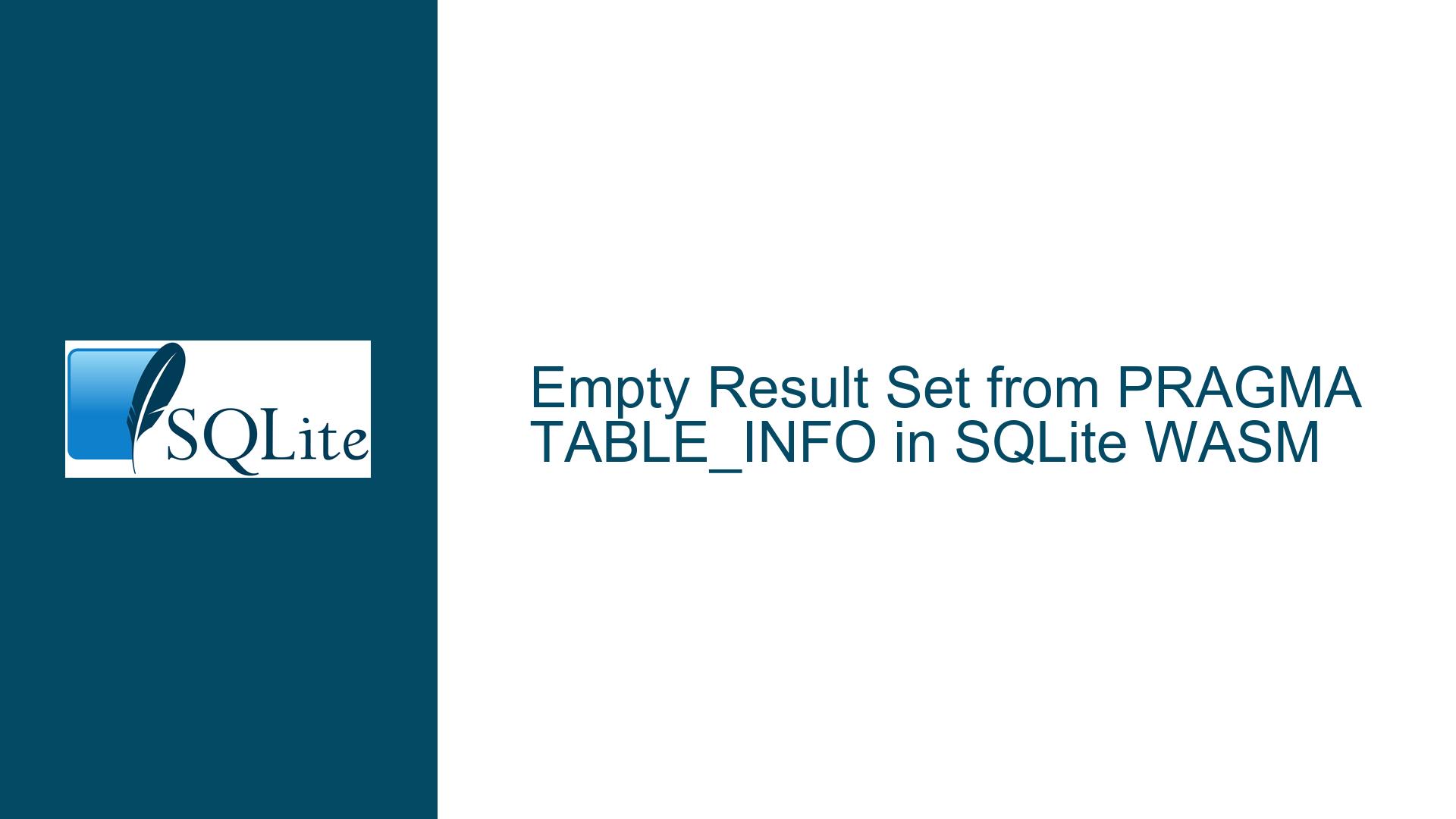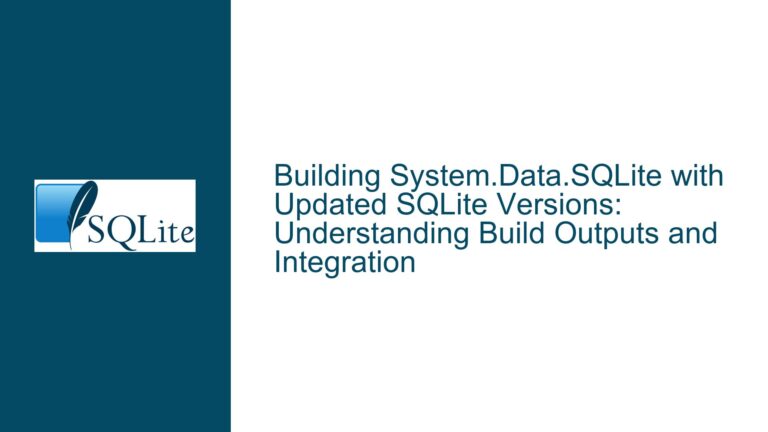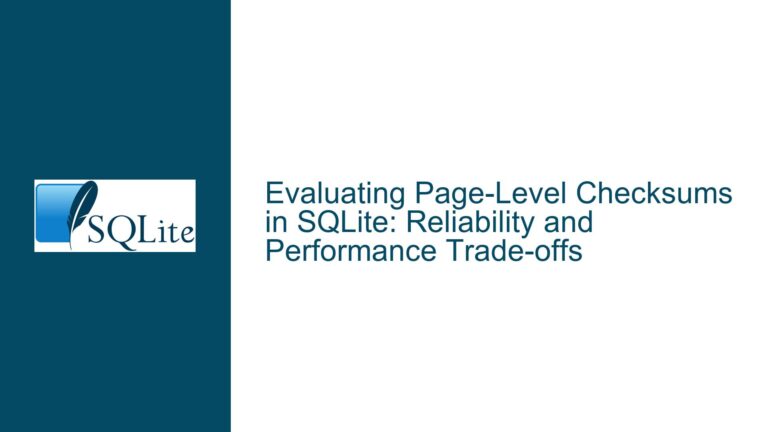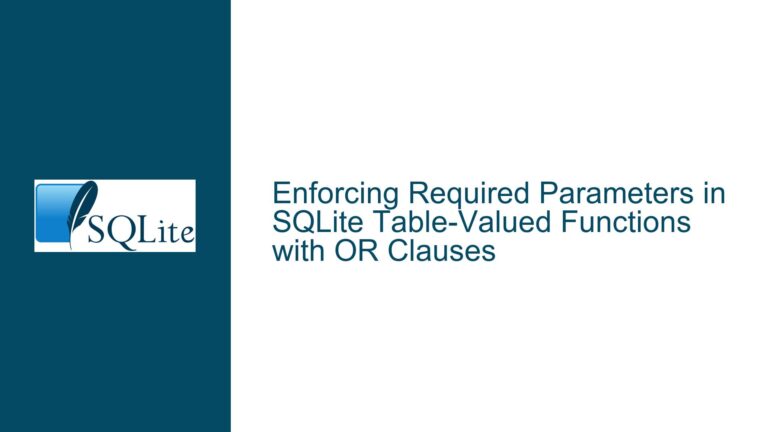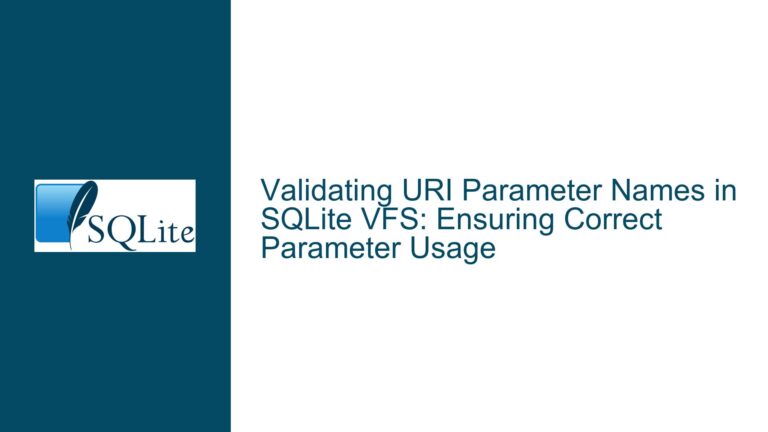Empty Result Set from PRAGMA TABLE_INFO in SQLite WASM
Understanding the Empty Result Set from PRAGMA TABLE_INFO in SQLite WASM
When working with SQLite in a WebAssembly (WASM) environment, developers often rely on the PRAGMA TABLE_INFO command to retrieve metadata about a table’s columns. However, a common issue arises when this command returns an empty result set, even when the table exists. This behavior can be perplexing, especially for those accustomed to the traditional SQLite CLI or other environments where the command works as expected. The core of the problem lies in the nuances of SQLite WASM’s implementation, particularly how it handles string literals, VFS (Virtual File System) drivers, and pragma commands.
The PRAGMA TABLE_INFO command is designed to return information about the columns of a specified table, including the column name, data type, whether it can be null, and other attributes. In a typical SQLite environment, this command is straightforward and reliable. However, in SQLite WASM, several factors can lead to an empty result set, even when the table exists. These factors include the use of double quotes instead of single quotes, the behavior of the HTTP VFS driver, and the handling of xFileControl calls within the VFS driver.
To fully understand and resolve this issue, it is essential to delve into the specifics of SQLite WASM, the role of VFS drivers, and the correct usage of pragma commands. By examining these elements in detail, we can identify the root causes of the problem and implement effective solutions.
The Role of String Literals and VFS Drivers in SQLite WASM
One of the primary causes of the empty result set issue is the incorrect use of string literals in the PRAGMA TABLE_INFO command. In SQLite, string literals should be enclosed in single quotes ('). While double quotes (") are also supported in some contexts, their usage is deprecated and can lead to unexpected behavior, especially in SQLite WASM. The WASM build of SQLite disables support for double-quoted strings, which means that using double quotes in a pragma command can result in an empty result set.
For example, consider the following command:
PRAGMA TABLE_INFO("table");
In a traditional SQLite environment, this command might work as expected. However, in SQLite WASM, it is likely to return an empty result set because the double quotes are not recognized as valid string delimiters. The correct usage would be:
PRAGMA TABLE_INFO('table');
This ensures that the string literal is properly interpreted by SQLite WASM, increasing the likelihood of obtaining the desired result.
Another critical factor contributing to the empty result set issue is the behavior of the VFS driver, particularly the HTTP VFS driver. The VFS driver is responsible for managing file operations in SQLite, and its implementation can significantly impact the behavior of pragma commands. In the case of the HTTP VFS driver, certain xFileControl calls are not handled correctly, leading to issues with pragma commands like PRAGMA TABLE_INFO.
The xFileControl function is a part of the VFS driver’s interface, and it is used to handle various control operations on files. One such operation is SQLITE_FCNTL_PRAGMA, which is invoked when a pragma command is executed. If the VFS driver does not return an error for an unrecognized xFileControl call, SQLite may not process the pragma command correctly, resulting in an empty result set.
In the case of the HTTP VFS driver, the issue was traced back to the handling of xFileControl calls. Specifically, the driver was not returning an error for xFileControl calls that were not SQLITE_FCNTL_SYNC. This oversight caused SQLite to misinterpret the pragma command, leading to an empty result set. By modifying the VFS driver to return an error for unrecognized xFileControl calls, the issue was resolved, and the PRAGMA TABLE_INFO command began to function as expected.
Resolving the Empty Result Set Issue in SQLite WASM
To address the empty result set issue in SQLite WASM, developers must take a systematic approach that involves verifying the correct usage of string literals, ensuring the proper handling of xFileControl calls in the VFS driver, and testing the behavior of pragma commands in the WASM environment.
First, it is crucial to ensure that string literals in pragma commands are enclosed in single quotes. This simple change can often resolve the issue, as it ensures that SQLite WASM correctly interprets the table name. For example, instead of using:
PRAGMA TABLE_INFO("table");
Developers should use:
PRAGMA TABLE_INFO('table');
This adjustment aligns with SQLite’s string literal syntax and avoids the pitfalls associated with double-quoted strings in the WASM build.
Second, developers should examine the behavior of the VFS driver, particularly the handling of xFileControl calls. If the VFS driver does not return an error for unrecognized xFileControl calls, it can lead to issues with pragma commands. To resolve this, the VFS driver should be modified to return an error for any xFileControl call that it does not explicitly handle. This ensures that SQLite can correctly process pragma commands and return the expected results.
For example, in the case of the HTTP VFS driver, the issue was resolved by ensuring that the driver returned an error for xFileControl calls that were not SQLITE_FCNTL_SYNC. This change allowed SQLite to properly handle the SQLITE_FCNTL_PRAGMA call, resulting in the correct execution of the PRAGMA TABLE_INFO command.
Finally, developers should thoroughly test the behavior of pragma commands in the SQLite WASM environment. This involves creating test cases that cover various scenarios, including the use of different string literals, the presence or absence of tables, and the handling of xFileControl calls by the VFS driver. By systematically testing these scenarios, developers can identify and address any issues that may arise, ensuring that pragma commands function as expected in the WASM environment.
In conclusion, the empty result set issue with PRAGMA TABLE_INFO in SQLite WASM can be resolved by paying close attention to the correct usage of string literals, ensuring the proper handling of xFileControl calls in the VFS driver, and thoroughly testing the behavior of pragma commands. By following these steps, developers can overcome the challenges associated with SQLite WASM and leverage its full potential in their applications.
